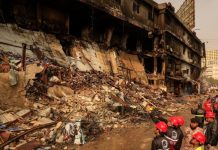By Ajmal Khan Yousafzai
ISLAMABAD: A day after provinces rolled back quarantine restrictions amid a decline in new infections, Minister for Planning, Development and Special Initiatives Asad Umar, while comparing country’s coronavirus situation to that of its neighbours, expressed satisfaction as he said the country was on the path to recovery.
Observing Pakistan’s infection rate and the death toll was much lower than its neighbours, the minister, however, warned that the situation could worsen if people stopped following precautions. People flocked to gyms, salons and restaurants that opened on Monday for the first time in five months after being shut to curtail the pandemic. The country has recorded more than 285,000 cases and nearly 6,110 deaths but has seen a slowing of numbers since June, when it recorded nearly 7,000 infections and 118 deaths in a single day.
Addressing a press conference on Tuesday, Umar said: “Look at the regional situation. The positivity rate in Pakistan is around three whereas the positivity rate is 9.4 in Iran and 9.8 in India almost three times higher. The positivity rate in Bangladesh in 23/24 which is eight times higher than Pakistan’s.
“If we compare deaths over the last 10-12 days according to population, Iran has seen 20 times the number of deaths as Pakistan while India has recorded around four to five times the number of fatalities. If we compare Pakistan’s deaths to India’s for yesterday, the neighbouring country has seen 10 times more fatalities.”
The minister said the difference was “quite big and increasing with time”. He pointed out that the same could happen to Pakistan if the people here were not careful. “If we don’t improve, if we are not careful, the spread of the virus which has reduced because of the people’s efforts can increase again.”
Umar said that the National Command and Operation Centre (NCOC) had observed that people were not following standard operating procedures (SOPs), especially in tourist spots and urged them to do so. He said that the pandemic was “not just a health issue”, adding that it had an effect on trade and people’s livelihoods.
“When we had to close the country, we saw more than 40 per cent decrease in our exports. Remittances also decreased around 40pc. This is equal to 40pc employment in the country. This [figure] represents millions of people who work daily and then their families eat. Even for the middle class, conditions became difficult after four to five weeks.
“If these remittances don’t come, how will dams and motorways be built?” Umar questioned.
Emphasising the importance of taking precautions, he said that they were “not so difficult”. “Wear a mask and maintain distance. The most important thing is your attitude; if you take precautions, we will see [further] improvement.”
He said the NCOC had directed the provincial chief secretaries to ensure that SOPs were followed and cases did not increase.
Umar said that Pakistan’s cases and deaths were not as high as projected earlier. “There were very fearsome projections. [Imperial College London simulation] projected that most deaths would happen on Aug 10 and 78,000 Pakistanis would be infected. [On the contrary,] yesterday, 15 people died.”
He credited the government’s “concrete” trace, test and quarantine (TTQ) strategy for the fewer cases and fatalities. “Till now, we have traced 1.1 million people through this system and tested more than one million. More than 100,000 cases of the country’s positive cases were identified through it. These people benefited from early treatment and took precautions so [the virus] did not spread”.
He added that the government managed to reach 10.8 people from one contact, saying that Pakistan’s contact tracing system was comparable to South Korea’s and a “world-class system”.
He also credited the government’s smart lockdown strategy for the reduction in cases. “[The government] enforced more than 2,350 smart lockdowns. At least 85 smart lockdowns in 20 districts are still in place. We are [now] going towards micro smart lockdowns,” he said, explaining that this meant that only groups of houses would be placed under lockdown instead of entire areas.
Umar thanked the people for cooperating with the government. “The most important factor behind all of this is you, the people. A big section of society helped the government and took precautions. I also want to thank the media for the historic way in which they informed people and people then followed precautions. “The improvement you see is because the government and people together took decisions and followed them,” he said, adding that he was “confident that people will not let this victory they have achieved turn into a loss”.




